Tavares Strachan: Magnificent Darkness
(Front view) Inner Elder (Mary Seacole), 2023 Inner Elder (Biko as Septimius Severus), 2023 Inner Elder (Nina Simone as Queen of Sheba), 2023 Ceramic (Background) Andromeda (Green, Pink and White Galaxy), 2023 Sunflower (Yellow, White, and Blue Galazy), 2023 Cartwheel Galaxy (Blue, Purple, Red and White Galaxy), 2023 Oil, enamel and pigment on acrylic Installation view, Tavares Strachan "Magnificent Darkness" Marian Goodman Gallery, Los Angeles, 2024 Courtesy of the artist and Marian Goodman Gallery Photo credit: Elon Schoenholz
Marian Goodman Gallery Los Angeles is pleased to announce a solo exhibition of Tavares Strachan. The exhibition had an opening reception on February 17th and will conclude on April 13, 2024. Titled Magnificent Darkness, this immersive exhibition will feature several new bodies of work across six diverse and site-specific environments. Through an interconnected array of works comprising ceramic, bronze, marble, hair, neon, sound, and painting, this exhibition collectively professes a visual allegory toward the overarching exploration of light and darkness.
Encyclopedia of Invisibility (Pocket Guide), 2024 Leather, gilding, archival paper, lucite box and stand Overall: 9 1/4 x 12 1/8 x 10 in. (23.5 x 30.8 x 25.4 cm) Installation view, Tavares Strachan "Magnificent Darkness" Marian Goodman Gallery, Los Angeles, 2024 Courtesy of the artist and Marian Goodman Gallery Photo credit: Elon Schoenholz
Strachan’s work summons historical and cultural references, creating essential contextual collisions and connections to his celebrated, ongoing research project, The Encyclopedia of Invisibility. For this exhibition, a central installation from the Encyclopedia forefronts the surrounding gallery spaces, bringing light to a number of ‘invisible histories’ that have largely fallen by the historical wayside. A special, smaller format of the Encyclopedia in book form will also be on view. Nearby, a new work in neon, There is a Light in Darkness, draws on the words of James Baldwin and serves as the source for the audio work that can be heard throughout the exhibition space.
In the Seward Gallery, a vast and transportive earthen floor grounds two near-life-sized ceramic sculptures, Matthew Henson (Hunter’s Shirt Stacked with Football and Spear) and Andrea Crabtree (Potter’s Shirt Stacked with Diver’s Helmet), representing the figures of Matthew Henson, the African American explorer who discovered the North Pole, and Andrea Motley Crabtree, the first African American female diver for the U.S. Navy. Themes intrinsic to Strachan’s practice—ranging from human aspiration to the chronicle of elided histories—are evoked here through depictions of Arctic exploration and deep-sea discovery. Clay, as integral to human evolution and the creation story, is found repeatedly throughout the exhibition, from the Seward Gallery floor to the numerous ceramic sculptures on view.
Mind Field No. 1, 2023 Flocked hair on canvas 60 x 60 x 2 in. (152.4 x 152.4 x 5 cm) Amina (A Map of the Crown), 2023 Bronze, flocked hair 23 5/8 x 9 7/8 x 5 7/8 in. (60 x 25 x 15 cm) Installation view, Tavares Strachan "Magnificent Darkness" Marian Goodman Gallery, Los Angeles, 2024 Courtesy of the artist and Marian Goodman Gallery Photo credit: Elon Schoenholz
In an intimate space off the main lobby sits Amina (A Map of the Crown), a bronze bust sculpture adorned with a traditional West African hairstyle. The closeness of these materials offers an insightful reconciliation of the distance between the deeply personal, political, and present nature of hair and the venerable qualities bestowed upon bronze sculpture—some of the earliest and most accomplished bronze works date to Africa in the 10th century. A new series of paintings also debuts here. Mind Field No. 1 sits in dialogue with Amina, together begetting references ranging from the history of the monochrome to metaphorical notions of hair as a protective layer, symbol of knowledge, and means for communication and transport.
Jah Rastafari with Rice Field (Stacked with Pineapple, Shield, and Football), 2023 Ceramic, rice field installation 110 1/4 x 59 x 59 in. (280 x 149.9 x 149.9 cm) Installation view, Tavares Strachan "Magnificent Darkness" Marian Goodman Gallery, Los Angeles, 2024 Courtesy of the artist and Marian Goodman Gallery
In the adjacent Hudson gallery, a ‘meadow’ of dried rice grass transforms the space into a landscape, referencing rice as a staple of the Afro-Caribbean diet. Viewed from above, the terrain is shaped in the form of the Ghanaian Adinkra symbol for Nsaa, which symbolizes quality and durability, and metaphysically denotes excellence and authenticity. The dramatic floorscape finds its focal point in Jah Rastafari (Stacked with Pineapple, Shield and Football), 2023, a multifaceted ceramic sculpture illustrating a bricolage of spiritual and cultural forms from disparate centuries.
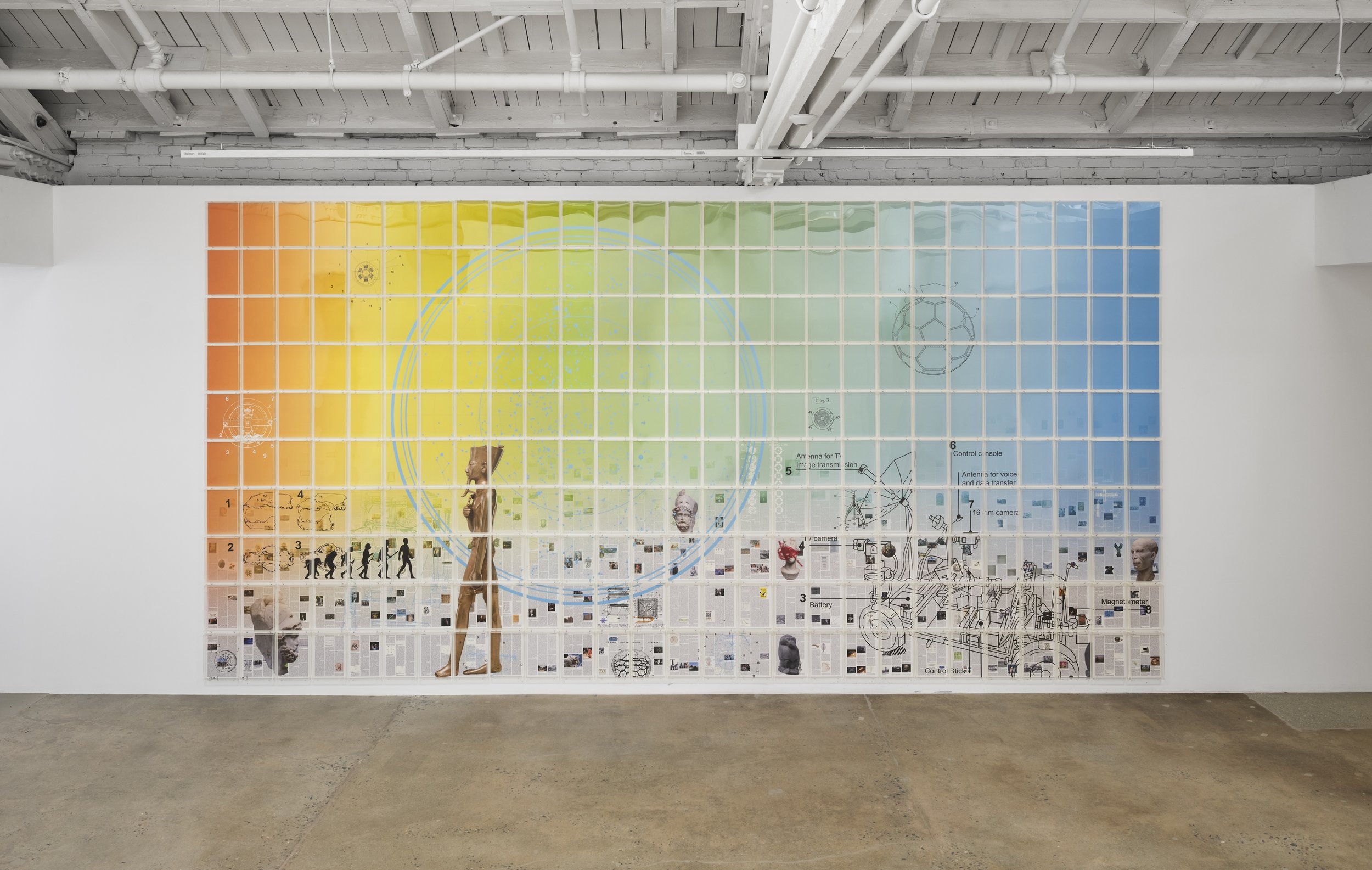
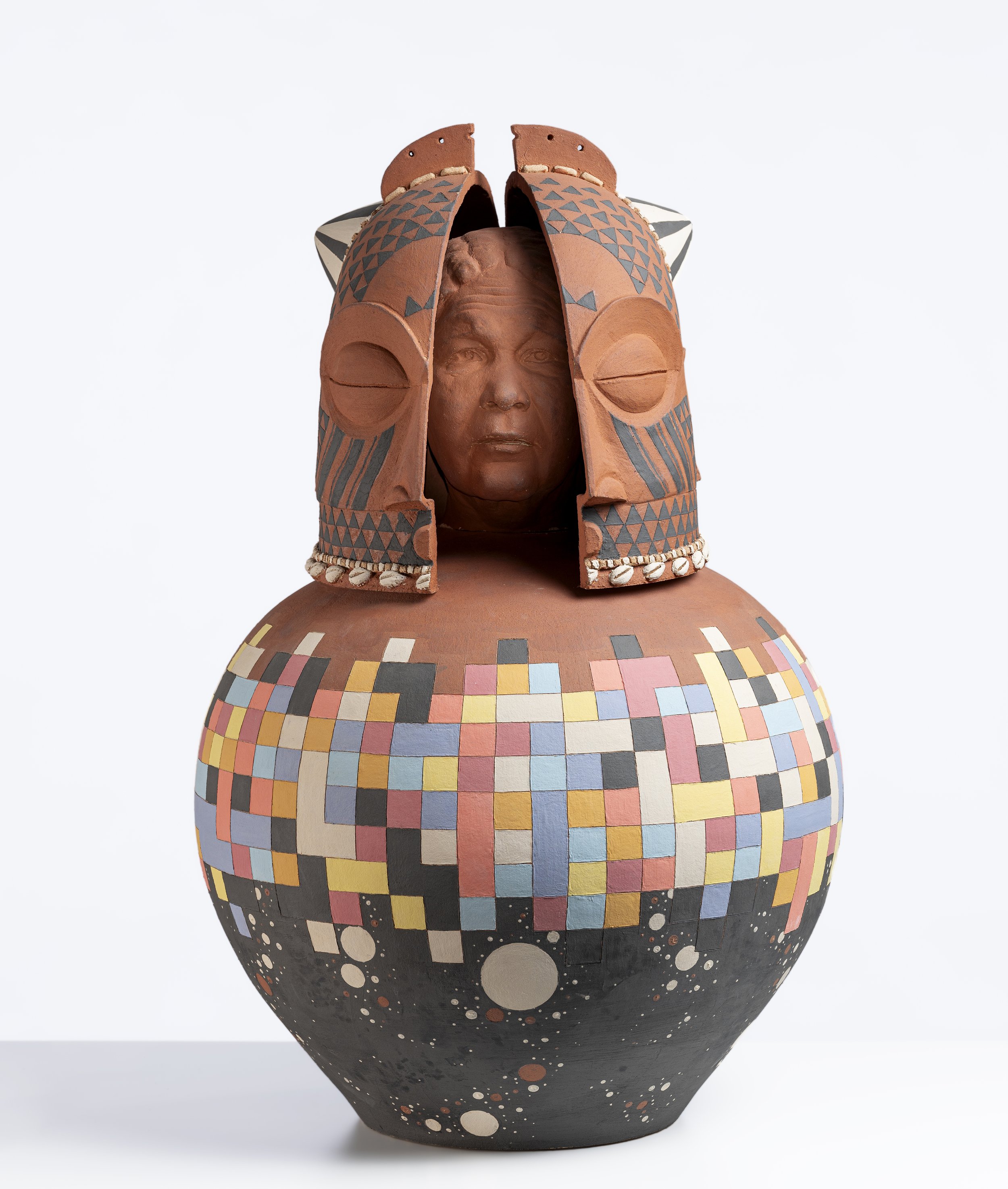

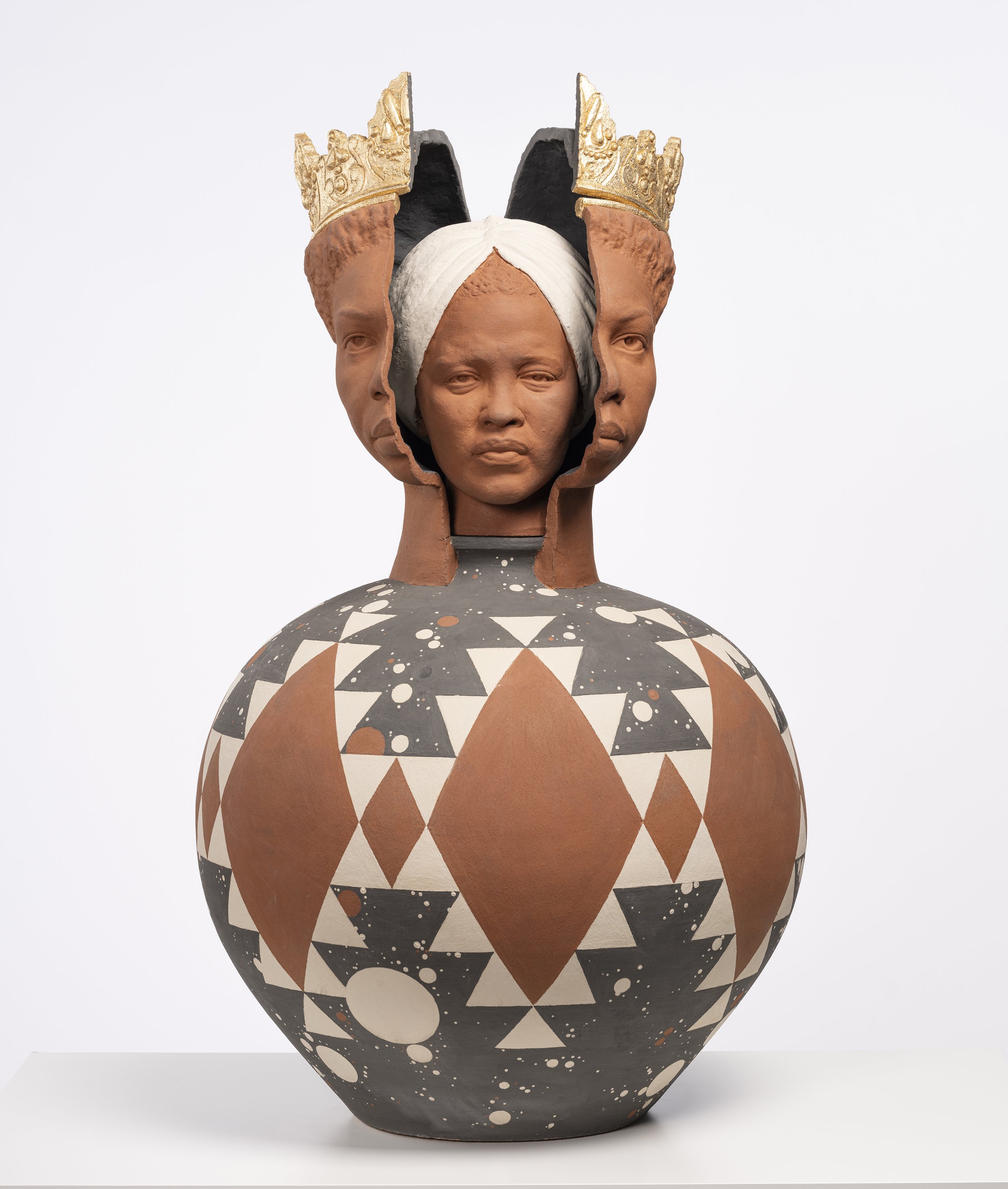
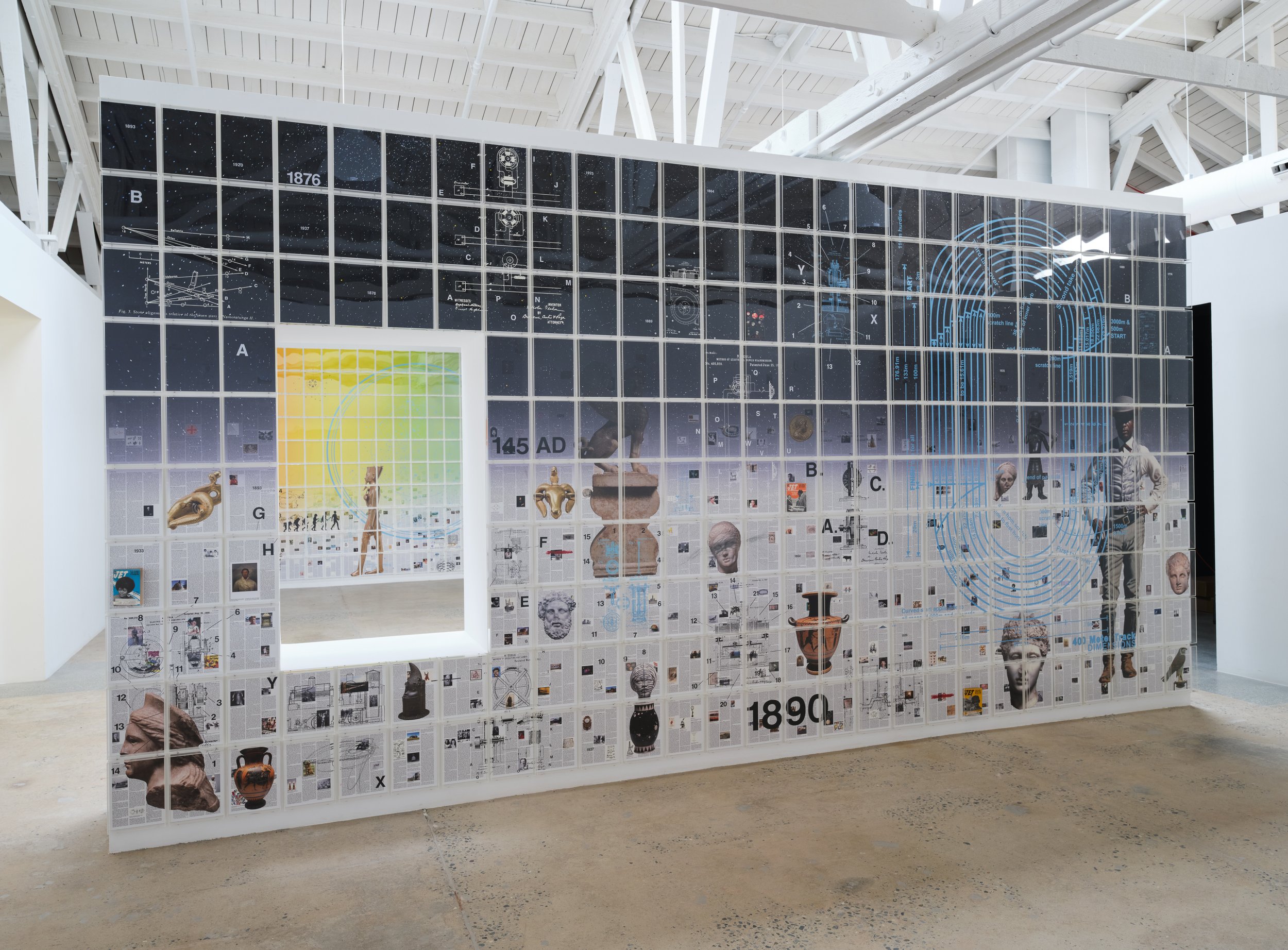
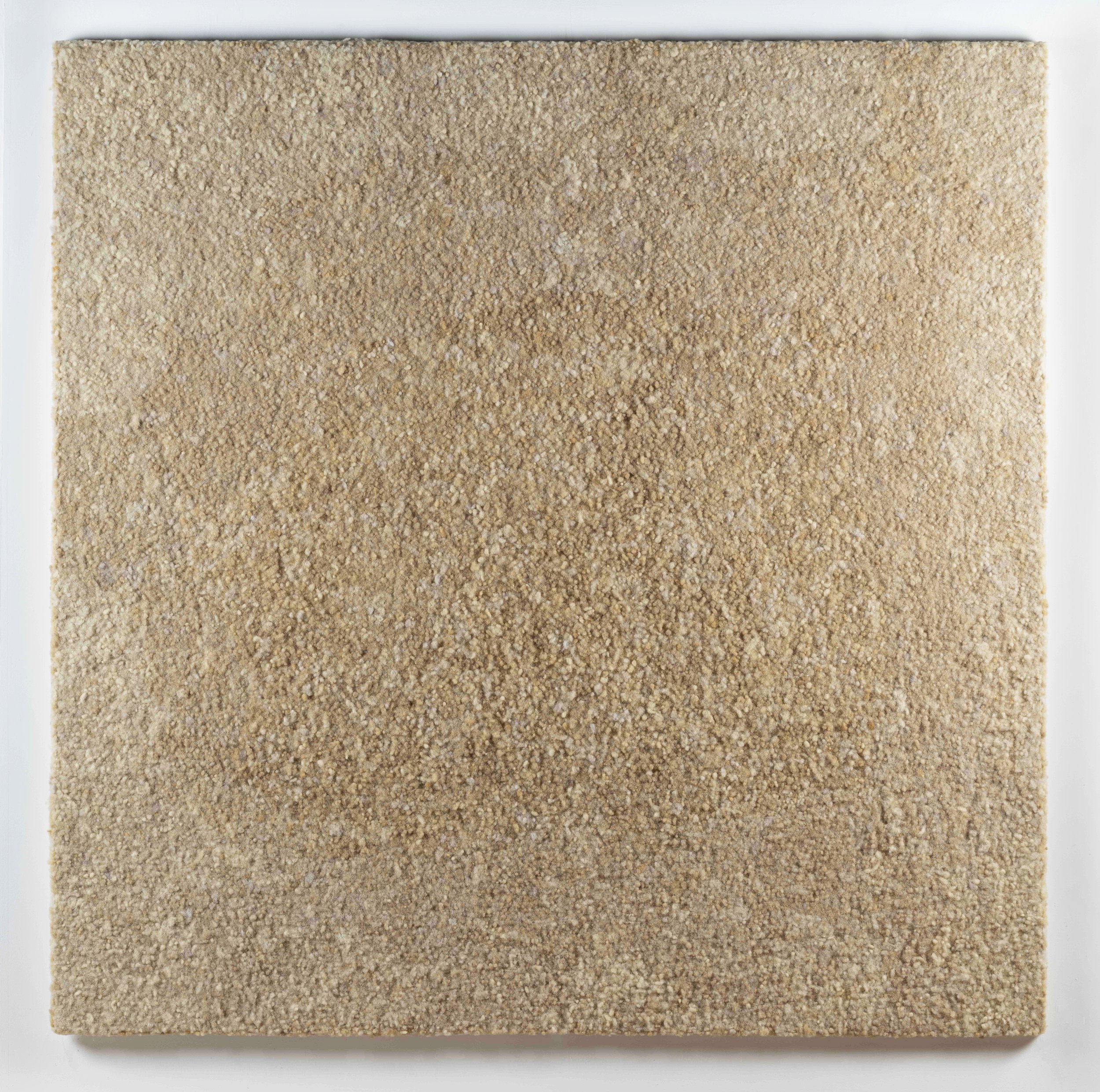
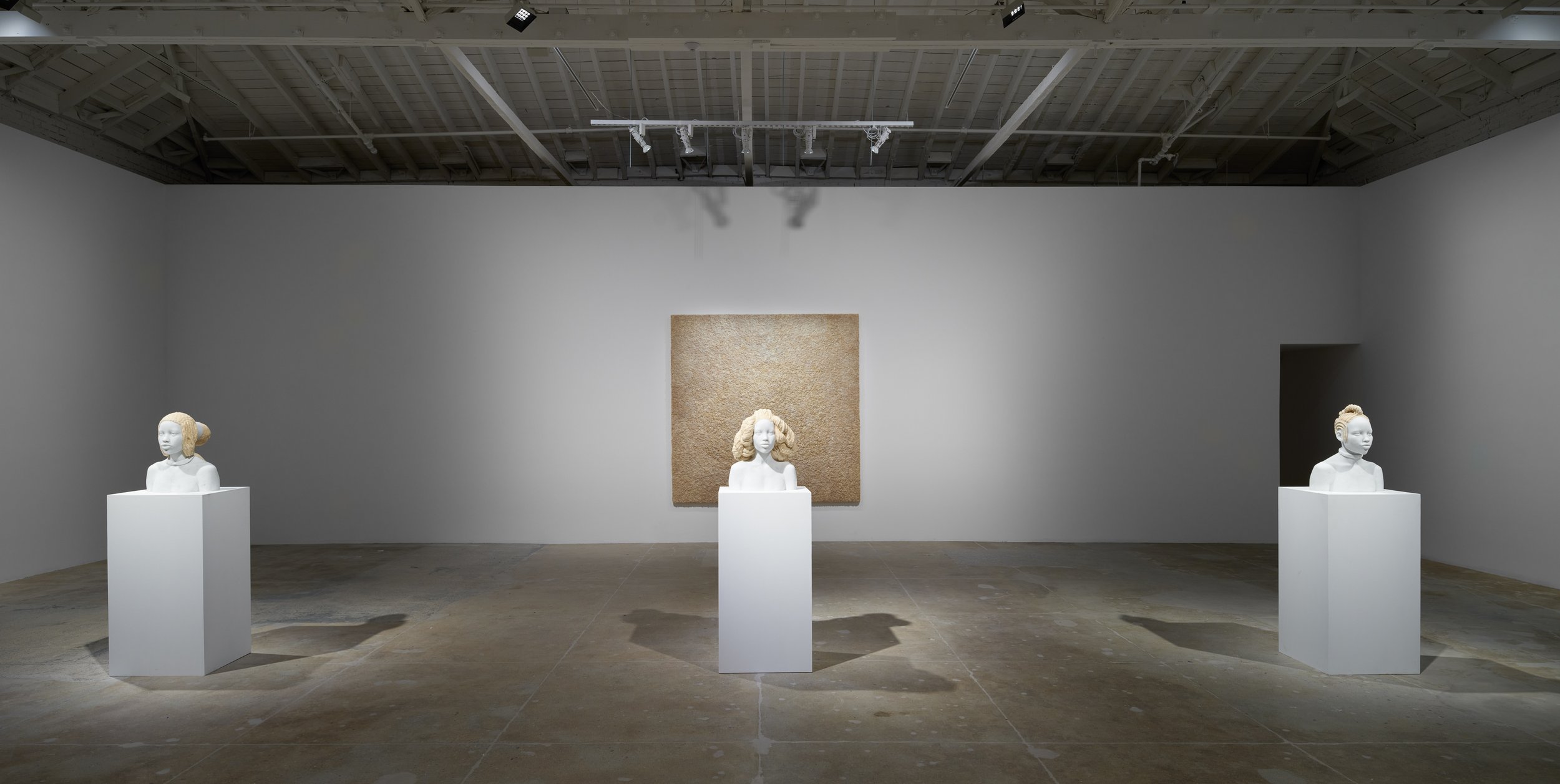
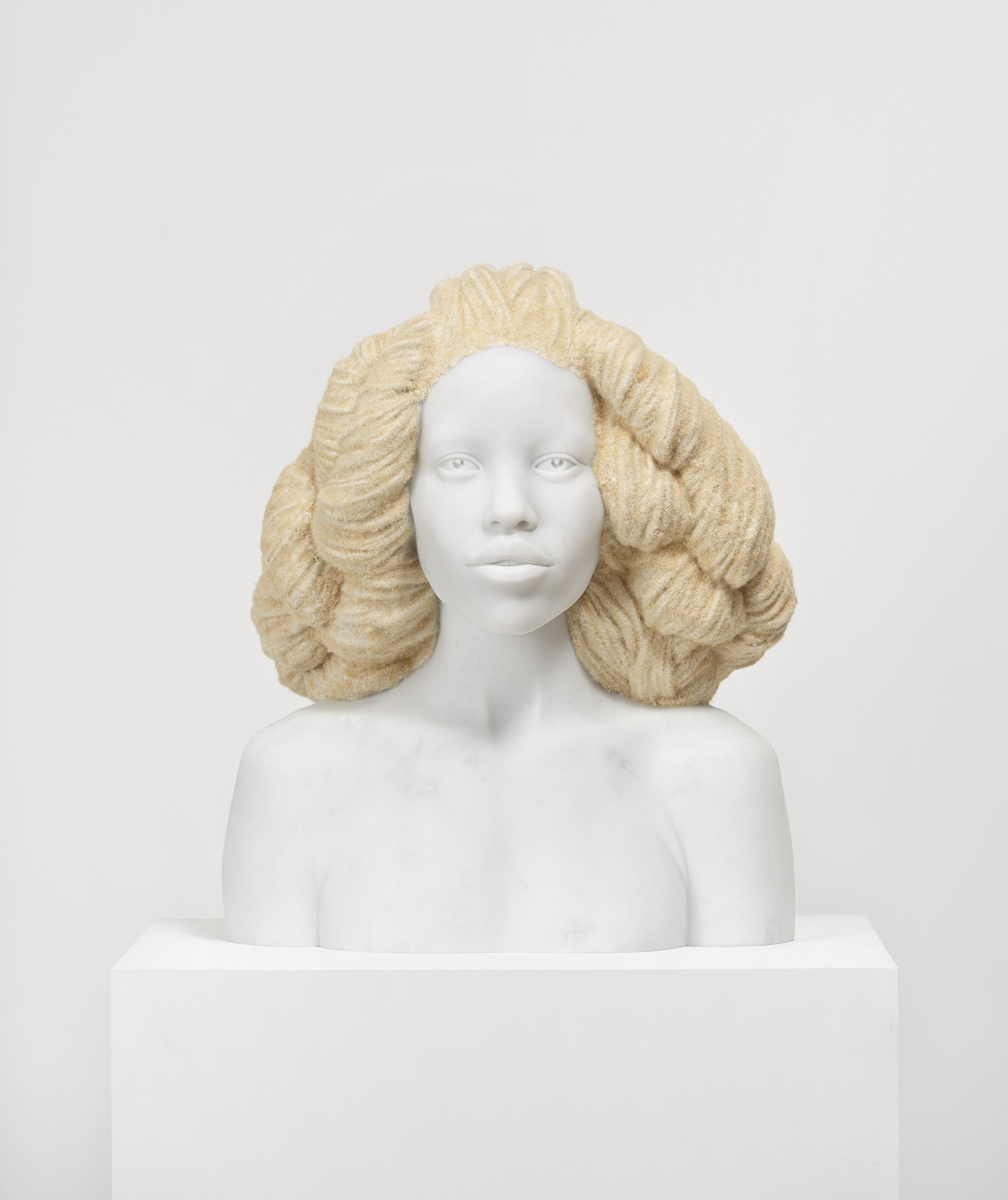
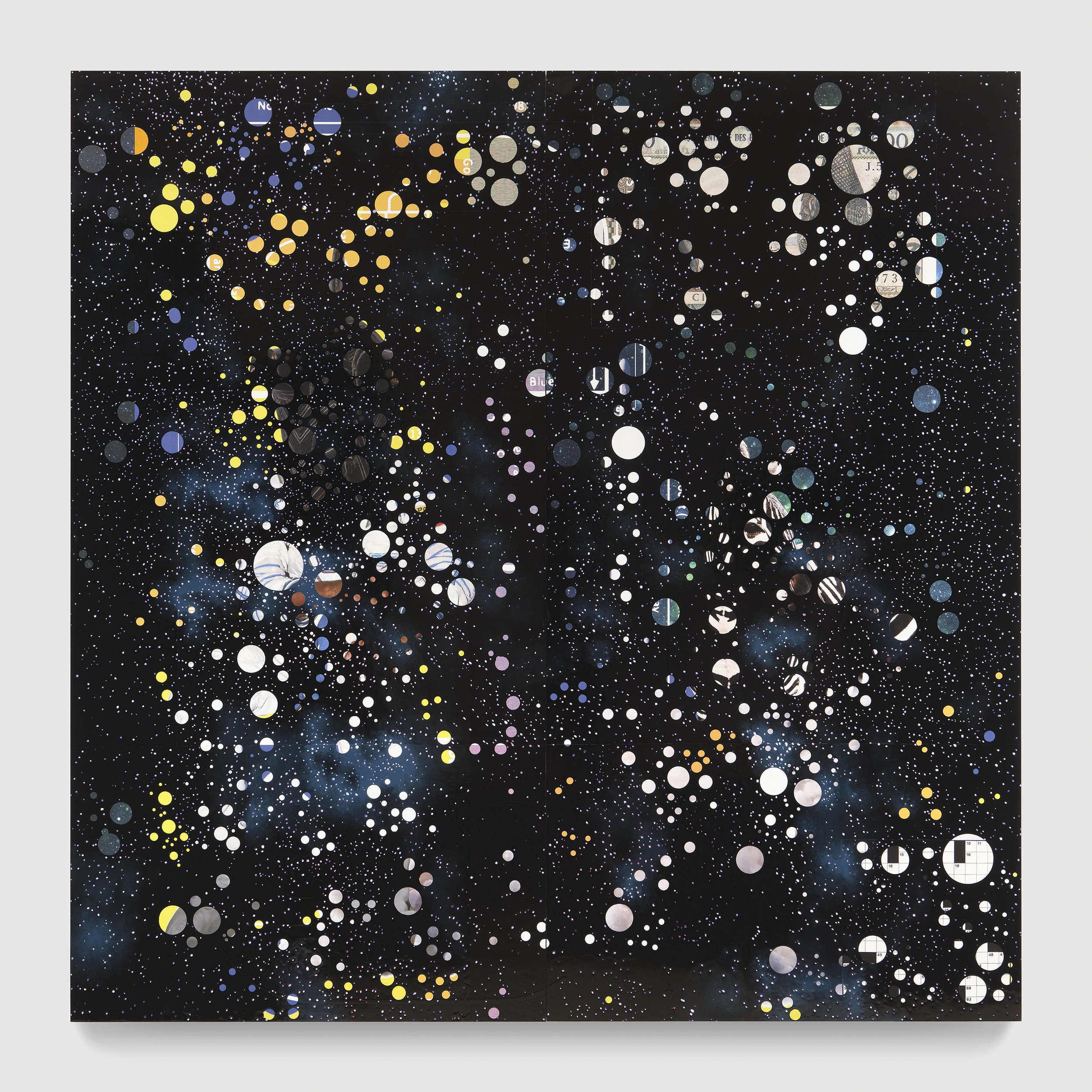
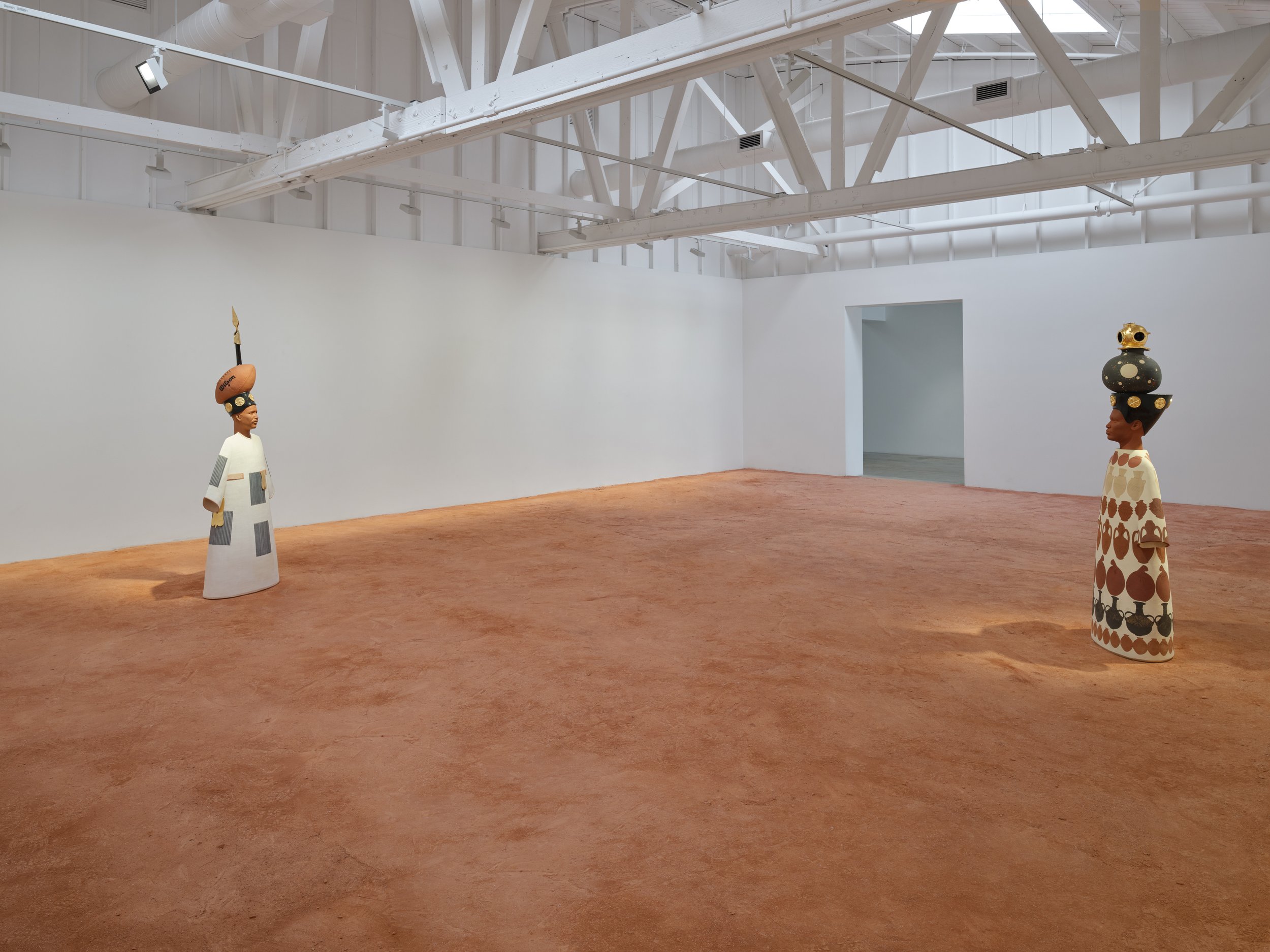
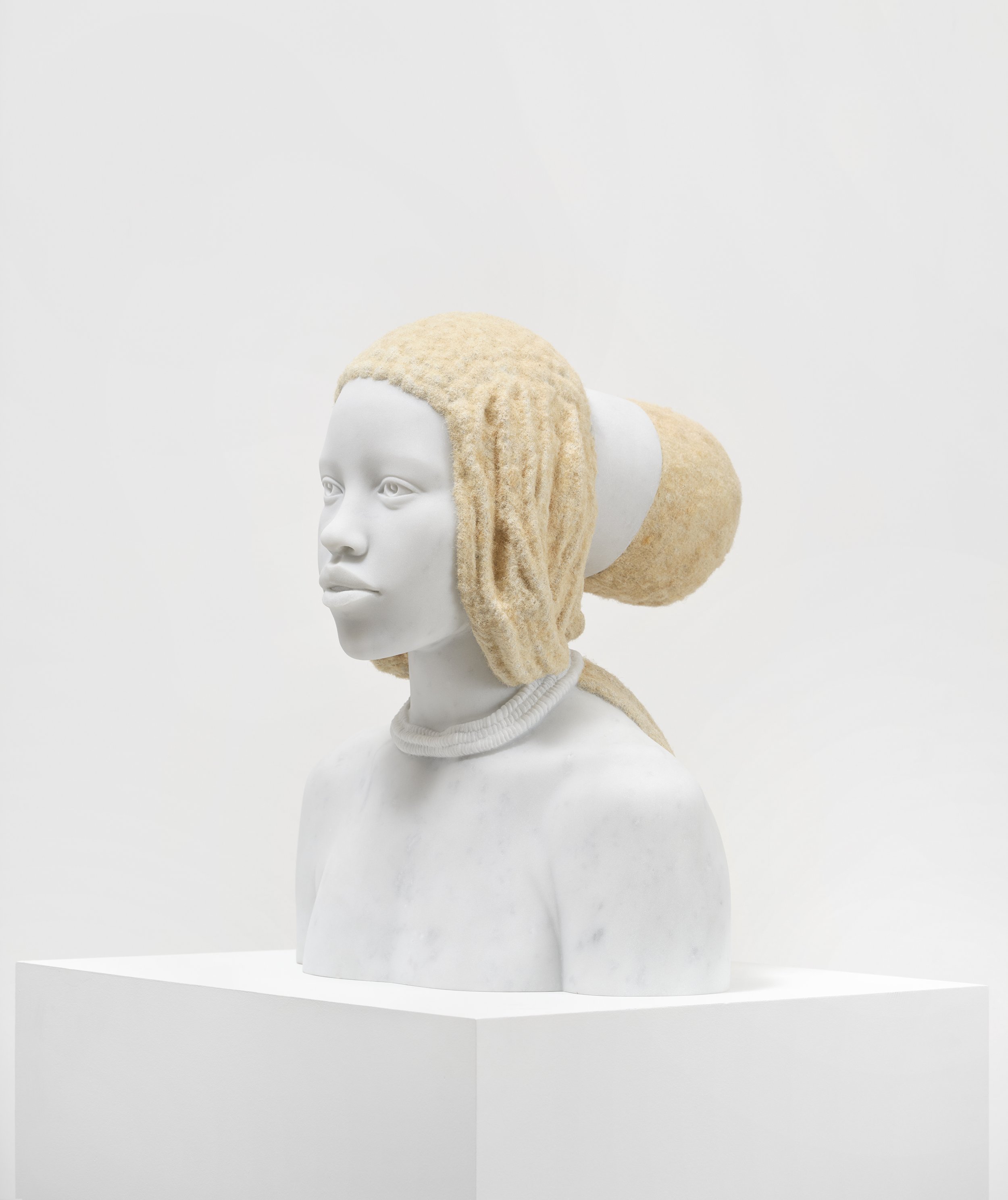
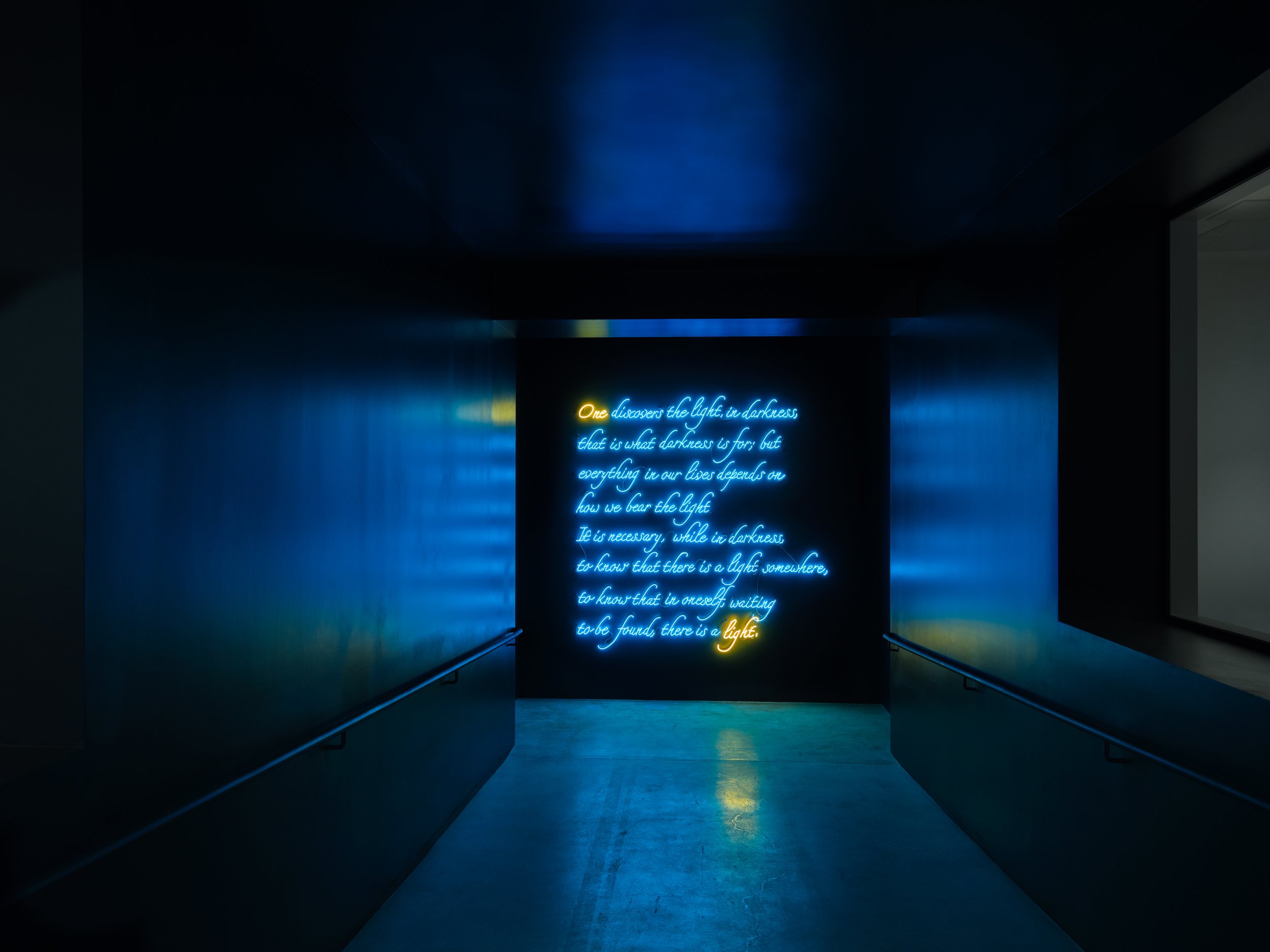
The Main Gallery continues the dialogue of the interrelation of light and darkness opening with the related words of Baldwin. Split in two, the divided spaces become each other’s complements. In the darkness of one half, new Galaxy paintings, depicting distant constellations and galaxies as symbols of the invisible systems that structure our world, are placed in relation to three ceramic sculptures: Inner Elder (Mary Seacole); Inner Elder (Biko as Septimius Severus); and Inner Elder (Nina Simone as Queen of Sheba), historical figures who carry their own symbolic cosmology and are symbols of a lost language. These works explore the traditions of storytelling in West African and Afro-Caribbean cultures, serving the dual purpose of vessels made of earth that host the daily materials of rice and water, and canvases to document stories through symbols and patterns. The contrasting, light-filled gallery presents a white painting of hair, Mind Field No. 8, alongside three white marble sculptures, Makeda (A Map of the Crown), Moremi (A Map of the Crown), and Amanirenas (A Map of the Crown), collectively drawing questions around whiteness and related visual discourses of ancient sculpture.
Current and upcoming projects include a new sculptural installation, The First Supper, presented in the context of an exhibition at the Royal Academy of Arts, London, and a solo exhibition at the Hayward Gallery, London, to open in June 2024. Two new publications, The Awakening and In Total Darkness, have been published by Marian Goodman Gallery and will be available during the exhibition.
Strachan was born in 1979 in Nassau, Bahamas, and currently lives and works between New York City and Nassau. He received a BFA in Glass from the Rhode Island School of Design in 2003 and an MFA in Sculpture from Yale University in 2006. He draws on both the resources and community of his birthplace, dividing his time between his studio in New York and Nassau, where he has established an art studio and scientific research platform B.A.S.E.C. (Bahamas Aerospace and Sea Exploration Center) and OKU, a not-for-profit community project encompassing an artist residency and exhibition spaces, a scholarship program, and after-school creative programs.
Strachan’s work has been featured in numerous solo exhibitions including You Belong Here, Prospect 3. Biennial, New Orleans (2014); The Immeasurable Daydream, Biennale de Lyon, Lyon (2013); Polar Eclipse, The Bahamas National Pavilion 55th Venice Biennale, Venice (2013); Seen/Unseen, Undisclosed Exhibition, New York (2011); Orthostatic Tolerance: It Might Not Be Such a Bad Idea if I Never Went Home Again, MIT List Visual Arts Center, Cambridge (2011); among others.
He has been the recipient of numerous awards including the John D. and Catherine T. MacArthur Foundation fellowship (2022), Artist in Residence at the Getty Research Institute (2019-2020), the Frontier Art Prize (2018), and the Allen Institute’s inaugural artist-in-residence (2018), LACMA Art + Technology Lab Artist Grant (2014), Tiffany Foundation Grant (2008), Grand Arts Residency Fellowship (2007), and Alice B. Kimball Fellowship (2006). In his TED talk in April 2023, Strachan discussed the need to restore lost stories, as exemplified within his work, The Encyclopedia of Invisibility.
For more information about the exhibit, please visit the Marian Goodman Gallery’s site. The gallery can be found on Instagram and Artsy, too.



